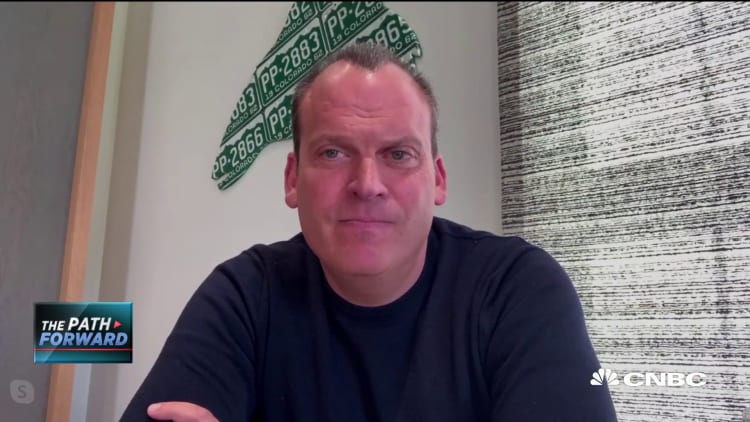
Junior's Cheesecake owner Alan Rosen on Wednesday defended his decision to leave his restaurant employees on furlough despite receiving money from the Treasury Department's newly created small business loan program.
Rosen told CNBC on Wednesday that he believes keeping the 650 workers on furlough, for the time being, is in the long-term best interest of the business as it seeks to navigate the coronavirus pandemic.
"If we take this money and don't treat it like the precious capital that it is ... then we've done a disservice to everyone, the people who lent us the money, to our employees," Rosen said on "Power Lunch."
Rosen first explained his strategy Tuesday on CNBC, generating some criticism from people who contended that keeping workers on unemployment insurance while also taking a loan through the Paycheck Protection Program was problematic.
Rosen, whose grandfather founded Junior's in Brooklyn, New York, in 1950, said he disagrees with any suggestion that he is unfairly taking advantage of the program, which offers small business owners loans worth up to 2.5 times their average monthly payroll.
Loans made through the program can be forgiven if they are used to cover payroll, and certain other expenses such as rent and utilities, in the eight-week period after the loan is made. If the criteria to be forgiven are not met, the money becomes a two-year loan at 1% interest.
"I think I'm actually taking the honorable approach and saying, I'll use the money either before the eight weeks or after depending on how business allows, and if it's after then I have to pay back the loan," Rosen said.
Rosen said his concern is that spending all the money he's received through the program before Junior's has a clear path to reopen may mean the restaurant ultimately doesn't have the capital to reopen when it's deemed safe to do so. He also said he worries about having to operate at reduced capacity, therefore impacting revenue.
"If we take people off unemployment today and use up all that grant money and in eight weeks we're not operating efficiently because of this virus ... we then have to put people on unemployment. We've haven't only singularly dipped, we've now put them back on unemployment and we got a free loan," he contended Wednesday.
The Paycheck Protection Program, established by the $2 trillion economic stimulus measure passed by Congress in late March, had $350 billion set aside for it.
But that money could run out as soon as Wednesday night, CNBC has reported, and a measure to add an additional $250 billion failed last week in the Senate.
On Tuesday, Rosen said Junior's had received $1.4 million and with the remaining loans that are pending it will total $5.5 million. He said he applied for four loans, one for each of Junior's restaurant locations — three of which are in New York City and another is in Connecticut.
If the Junior's PPP loan is not forgiven, Rosen said Wednesday that it is possible the business could struggle to pay it back if the Covid-19 outbreak fundamentally changes the levels at which people dine at restaurants.
Rosen said he believes that demonstrates the need for the eight-week window for forgiveness to be extended.
"As this virus hopefully lessens and depending on the time frame, some of these rules ... may actually have to be pushed back a bit," he said.
Karen Kerrigan, CEO of the Small Business & Entrepreneurship Council, an industry group, agreed that regulation around PPP loans should be amended.
Appearing Wednesday on "Power Lunch," Kerrigan argued the economic outlook in the country has gotten significantly worse than when the legislation was passed in late March. She said believed in Rosen's strategy for using the loans.
"There does need to be more flexibility in the rules," she said.
The Treasury did not immediately respond to a request for comment.



